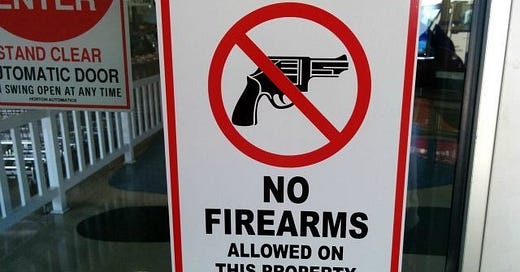Since You Can't Stop The Killers You'd best Not Disarm the Citizens
The Lessons from Maine's Mass Shooting are Not Knew
How often have we heard this sad story? Someone snaps and goes on a mass shooting. Several or many are injured or killed. The usual suspects rile up the usual politicians who demand we use an unlawful act to deprive law-abiding citizens of their right to own or carry firearms. The government knows best. You don’t need them. We’ll protect you - even though they know they have no legal obligation to do that. Months or years later, it is discovered that this benevolent government not only learned about the shooter but had one or more (often multiple) interactions demonstrating a problem and opportunities to intervene before things turned fatal.
The Parkland School shooter was known to local and federal “officials” and a long list of others who had multiple interactions, warnings, let’s call them red flags, but did nothing. That’s not the only example, so it should not surprise you that the recent mass shooting in Maine has concluded the same thing.
An independent commission released its final report on Tuesday, finding that local Army and police officials knew Robert Card was suffering a mental health crisis in the months before the shooting.
Yet officials did not follow up on warnings about the 40-year-old's mental state and did not remove his guns, the commission wrote.
Being close to the situation, I commented on the shooting and what typically follows.
I’ve seen my share of notions about Lewiston. How the “authorities” knew the shooter, had been in contact, or how he had a history of mental illness, and no one thought to keep an eye on him. Maybe they were too busy spying on parents who opposed explicit sexual material in grade schools or engaging in witch hunts against doctors who treated COVID patients the wrong way. So many distractions. Whatever the issue, the system that insists it will protect us where we are unarmed failed to do that in Lewiston, which is a point left out of many discussions.
Mr. Card may have been crazy, but like his fellow mass shooters, he had the sense to choose soft targets where he knew his victims would be disarmed. It’s something else they all seem to share. The mental capacity to take advantage of the policies the left proposes after every shooting. Disarm more people in more places.
Call me a Second Amendment purist, but the most common factor in every mass shooting is the absence of equal or greater force and the ability of the allegedly mentally insane to know this.
Robert Card could have picked a gun range, a gun show, an NRA event, or any number of public or private locations where Mainers – who can still conceal carry without a permit – might be armed in numbers, someplace where it would be a challenge to shoot let alone kill more than one or two people before there was return fire.
Getting shot at changes your priorities and, in that situation, likely ends with the shooter dead. No statewide manhunt is needed. No suspicious suicide days later. He’s bleeding out on the floor of the first building he entered.
As for the government experts who would disarm us,
The report found Card’s commanding officer knew he was experiencing auditory hallucinations, engaging in aggressive behavior, collecting guns and making “ominous comments” months before the shooting.
“They ignored the strong recommendations from Card’s mental health providers to stay engaged in his care and take steps to remove weapons from his home,” Mr. Wathen said.
The Army Reserve also “neglected to share information relating to Card’s threatening behavior” with other relevant authorities, including the sheriff’s office. Mr. Wathen said some of the commission’s requests for information from the Army remain unresolved.
They are not required to protect us and are wholly incapable of doing so in truth, logistically, or even if they had the best intentions. It is impossible to make the promise and keep it. They appear similarly ill-equipped to identify and help people at risk of losing control. So, what lessons?
None of them are new.
The government is incapable of protecting us - that the best defense against mass shootings is an individual culture of responsible self-defense. And that the experts in the bureaucracies are not adept at identifying and addressing mental health issues. That bureaucracies abhor the responsibilities they strive to accumulate in pursuit of larger budgets and more power. Perhaps that is why they are so keen to confuse kids about sex and gender and then pretend public schools that can’t teach reading and math can address the mental health issues it created. Problems that have, not uncoincidentally, resulted in mass shootings.
I don’t want to think they are grooming killers or that the goal is more bodies growing cold, but if public safety matters and you can’t stop the killers, you’d best not disarm the citizens.




The only way to stop a bad person with a gun is a good person with a gun. More lives have been saved when someone is armed and violence occurs. No one reports those incidences.
You 2nd Amendment Purist! :^D
What I'm not clear on is whether you think that the shooters *should* have been disarmed *before* doing anything wrong, based on *expectations* that they might do something terrible, i.e., whether official assessments of 'mental health' should be sufficient to strip so-far-still-innocent persons of their fundamental rights.
That is, are you saying that the police *should* protect us in this way, but are just too lousy at it to be able to trust them? Or that they *shouldn't* be doing it in the first place?